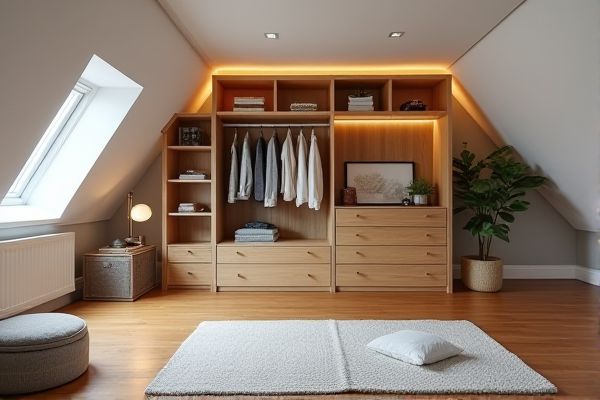
Attic organizers maximize overhead storage space with sturdy, often custom-fitted solutions designed to handle seasonal items and bulkier belongings, while closet organizers focus on optimizing accessible daily storage with shelves, rods, and compartments tailored to clothing and accessories. Discover how choosing the right system can transform Your home's storage efficiency by reading the rest of the article.
Table of Comparison
| Feature | Attic Organizers | Closet Organizers |
|---|---|---|
| Purpose | Maximize storage in attic spaces | Optimize clothing and accessory storage in closets |
| Design | Durable, moisture-resistant materials | Adjustable shelves, rods, and bins |
| Common Items Stored | Seasonal decorations, memorabilia, bulky items | Clothes, shoes, accessories, daily wear |
| Space Constraints | Irregular shapes, low ceilings | Standard rectangular closet spaces |
| Installation | Custom shelving, heavy-duty racks | Modular, easy-to-install systems |
| Accessibility | Less frequent access, bulky storage | Daily use, easy reach |
| Cost | Mid to high depending on customization | Low to mid, budget-friendly options available |
Introduction to Attic and Closet Organizers
Attic organizers maximize vertical storage space with sturdy shelving and bins designed to withstand temperature fluctuations and dust. Closet organizers optimize accessible storage by incorporating adjustable shelves, rods, and drawers tailored for clothing and accessories. Both solutions enhance space efficiency but cater to distinct organizational needs and environments.
Key Differences Between Attic and Closet Organizers
Attic organizers are designed to maximize vertical and horizontal space with sturdy, weather-resistant materials to withstand temperature fluctuations and dust, ensuring your stored items remain protected. Closet organizers, on the other hand, prioritize accessibility and aesthetics, featuring adjustable shelves, hanging rods, and compartments tailored for clothing and everyday items. You should choose attic organizers for bulk storage and seasonal items, while closet organizers are ideal for daily use and easy organization of apparel.
Space Utilization: Attics vs Closets
Attic organizers maximize vertical and often underutilized overhead space, making them ideal for storing seasonal items, bulky containers, and long-term storage with minimal floor footprint. Closet organizers focus on more accessible, eye-level storage solutions, optimizing hanging space, shelves, and drawers for daily clothing and accessories organization. Efficient space utilization in attics hinges on custom shelving and modular bins, while closet systems prioritize compartmentalized designs to enhance quick retrieval and tidiness.
Types of Organizers for Attic Spaces
Attic organizers typically include heavy-duty shelving units, stackable bins, and hanging racks designed to maximize vertical and irregularly shaped spaces. Unlike closet organizers that focus on garment rods, cubbies, and shoe racks, attic solutions often incorporate moisture-resistant containers and modular systems to protect seasonal items and bulky storage. Choosing the right attic organizer ensures your belongings stay accessible and preserved despite temperature fluctuations and limited headroom.
Types of Closet Organizers for Efficient Storage
Closet organizers come in various types, including hanging shelves, adjustable rods, and modular drawer units, designed to maximize vertical space and keep garments neatly arranged. Shelf dividers and shoe racks help compartmentalize your items, preventing clutter and ensuring easy access to everyday essentials. Choosing the right closet organizer enhances your storage efficiency and maintains an orderly, functional wardrobe.
Pros and Cons of Attic Organizers
Attic organizers maximize unused overhead space, making them ideal for seasonal items and bulky storage, but they often require careful installation and may be less accessible than closet organizers. They help keep your attic tidy and protect belongings from dust and pests while maximizing vertical storage potential. However, attic organizers can be limited by attic temperature fluctuations and structural constraints, impacting their suitability for sensitive items.
Advantages and Disadvantages of Closet Organizers
Closet organizers maximize storage efficiency by utilizing vertical space and customizable compartments, making it easier to categorize clothing and accessories. However, they can be limited by closet dimensions and may require professional installation for optimal use. Compared to attic organizers, closet systems offer quicker access but less capacity and are typically less suitable for bulky or seasonal items.
Cost Comparison: Attic vs Closet Organization Solutions
Attic organizers typically cost more due to the need for durable, moisture-resistant materials and custom fittings to accommodate irregular spaces, whereas closet organizers often involve modular, standardized components that are generally more affordable. Your budget can stretch further with closet organization solutions, especially when utilizing ready-to-assemble units or DIY kits that enhance space without extensive modifications. Cost efficiency depends largely on the complexity of the installation and the specific materials required for optimal storage conditions in attics versus closets.
Which Organizer Suits Your Needs Best?
Attic organizers are designed to maximize vertical and irregular spaces, ideal for storing seasonal items and bulky belongings, while closet organizers optimize horizontal space for daily clothing and accessories. Your choice depends on the type of items you need to store and the layout of your space; attics benefit from heavy-duty shelving or stackable bins, whereas closets favor modular racks, drawers, and hanging solutions. Assessing your storage goals and space limitations will help determine which organizer suits your lifestyle best.
Final Thoughts on Attic vs Closet Organizers
Attic organizers are designed to maximize vertical and often irregular space, making them ideal for storing seasonal items, bulky boxes, or infrequently used belongings. Closet organizers prioritize accessibility and daily convenience, featuring shelves, rods, and drawers tailored to clothing and smaller accessories. Your choice depends on whether you need efficient long-term storage or easy, everyday access to your items.
 homyna.com
homyna.com